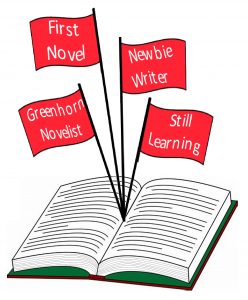You have to start somewhere, and everyone’s a rookie in the beginning. However, readers these days have plenty of choices, so there’s no need to wave a red flag advertising you’re a newbie. Avoid the mistakes common to novices and your work will stand out.
 Author Anne R. Allen wrote an excellent post about this and I encourage you to read it. What follows is my shorter and rearranged version.
Author Anne R. Allen wrote an excellent post about this and I encourage you to read it. What follows is my shorter and rearranged version.
I took Ms. Allen’s ten-item list of common mistakes and reordered them, starting with the errors I make less frequently, and ending with the blunders I still struggle with the most. I also put them in my own words.
10. Imitating Tom Swift. “Said” is a perfectly fine word and your audience will read right over it. Don’t substitute a different word for ‘said’ or add an adverb, as in Tom Swifty jokes. (“I’ll stand back aft,” Tom said sternly. “Let me darken that text in again,” Tom remarked.) In fact, don’t overdo the dialogue tags themselves. Often, you don’t need them. (No offense to Tom Swift. I’m a big fan.)
9. Taking God’s View. First person point-of-view is no longer typical, and can confuse readers. Best to stay in Third person POV, and make it very clear when you’re moving to a different character’s POV.
8. In Our Next Episode… All the chapters of your novel, or the sections of your short story, must contribute in a logical way to the plot of the whole tale, such that it’s an integrated work, not a string of separate, poorly related scenes.
7. Starring in Your Own Story. Give your characters distinctive personalities, quirks, motivations, and styles of speech. None of them should think or talk like you, or like some imagined, perfect version of you.
6. Forgetting Your Language Arts Classes. English isn’t an easy language, but if you want to be a writer, you need to know it well. Spell words correctly; use correct grammar; select words with precision. Build your vocabulary, but don’t overdo the thesaurus.
5. Starting As Others Do. Try to find a way to begin your story that isn’t overused already. In particular, if you start with a character waking up, consider a different beginning.
4. Writing to Brag. Get to the action. Cut your long, lovingly crafted descriptions. Delete, also, the arcane literary references, and don’t begin chapters with fancy quotations.
3. Making it (Too) Real. Cut out unnecessary dialogue that doesn’t further the plot. Delete scenes that transport a character from one place to another with nothing really happening on the trip. Don’t have your character overthink a decision, considering all the pros and cons; skip to the deciding part.
2. Using a Whole Lot of Words When Only a Few Are Necessary to Your Story. Don’t pad your tale with extra words. Don’t insult your readers by repeating yourself. Delete the needless adjectives and adverbs.
And the top rookie writing mistake (at least for me)…
1. Dumping Your Info and Explaining to Bob. It’s so tempting to convey all the backstory early on, so the reader understands how the characters got where they are. Instead, sprinkle in those details bit by bit within action scenes, to keep your plot moving. Also, avoid the unrealistic, over-explanatory dialogue that’s termed As You Know, Bob (AYKB).
Just because it is your first novel, doesn’t mean it has to read like a first novel. Don’t make the mistakes listed by Anne R. Allen, and you’ll stand a better chance of success. Take it from a former rookie who’s made many of those mistakes—
Poseidon’s Scribe
